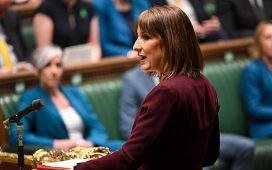Government borrowing costs hit 15-year high in bond turmoil
UK government borrowing costs hit a 15-year high amid concern interest rates will remain painfully high well into next year to tame inflation.
On a day of turmoil on global bond markets, the yield on ten-year gilts topped 4.75 per cent for the first time since the onset of the 2008 financial crisis, as investors bet interest rates will be 6 per cent or higher for much of 2024, spelling misery for millions of businesses and households with mortgages.
The prospect of ‘higher for longer’ interest rates also spooked investors in the US where the equivalent ten-year bond yield spiked to within a whisker of a 16-year high.
While for a long time it was hoped rises in interest rates would be followed by cuts, but it is now feared a prolonged period of pain will be required to bring inflation back under control – tipping the economy into recession in the process.
Michael Hewson, analyst at CMC Market, said: ‘It’s now less about how many more hikes are coming, and more about how long we could see rates staying at these levels.’

Inflation fight: Investors are betting that the Bank of England will be forced to keep interest rates at 6% or higher for much of 2024
Official figures this week showed inflation in the UK fell to 6.8 per cent in July – down from 7.9 per cent in June and a peak of 11.1 per cent in October.
But it remains well above the 2 per cent target and with wages rising at the fastest pace on record, investors are betting interest rates will hit 6 per cent this year and possibly 6.25 per cent next year.
According to financial markets, rates will stay above 6 per cent until the second half of next year in a nightmare ‘higher for longer’ scenario.
Rates have already been raised from 0.1 per cent to 5.25 per cent since December 2021.
In the US, it was hoped rates were at or close to the peak and would soon start to be cut to stave off the possibility of recession.
But in a sign that officials at the Federal Reserve remain on edge, the US central bank used an update on Wednesday to warn of ‘significant upside risks’ to inflation.
Samy Chaar, chief economist at Lombard Odier, said that rather than pricing in higher US rates, ‘what’s happening here is the market is pricing out cuts, or at least delaying them till later’.
A report by investment firm Oaktree Capital said: ‘Recession or no recession, we think the probability of higher-for-longer interest rates is far greater than the likelihood of near-term cuts.’










